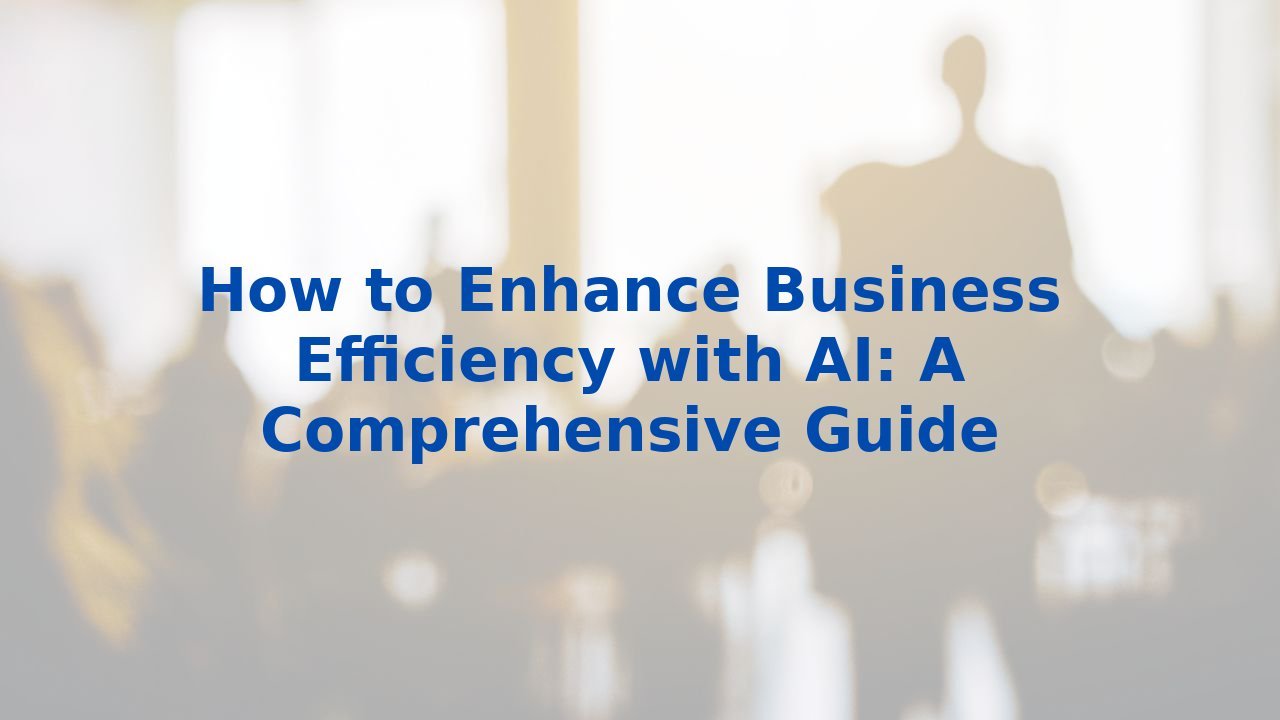How To Enhance Business Efficiency With AI: A Comprehensive Guide
How To Enhance Business Efficiency With AI: A Comprehensive Guide
In an age where speed and accuracy define success, businesses must continually seek innovative approaches to enhance operational efficiency. Artificial Intelligence (AI) stands at the forefront of this transformation, enabling organizations to streamline processes, make data-driven decisions, and foster a culture of innovation. Here’s how AI can enhance your business efficiency across various processes and the remarkable benefits it can bring to your organization.
1. Data Analysis and Interpretation
The cornerstone of informed decision-making is data. However, the sheer volume of available data often overwhelms traditional analysis methods. AI revolutionizes data analysis by automating data collection, processing, and visualization. This enables businesses to gather information more rapidly and accurately. For example, AI can categorize vast sets of text data to reveal underlying trends or anomalies, offering insights human analysts may overlook. By harnessing AI, organizations can ensure they are always a step ahead with real-time data interpretation.
2. Content Creation and Management
Creating and managing content can be a resource-intensive process. AI tools can significantly expedite content generation by providing preliminary drafts that human writers can refine. This collaborative approach saves time without sacrificing quality; however, it’s essential to remember that human intuition and creativity remain irreplaceable. By utilizing AI as an initial stepping stone, businesses can free up creative talent to focus on higher-order thinking and storytelling, ultimately enhancing content quality and engagement.
3. Customer Service and Support
In today's competitive landscape, customer satisfaction is paramount. AI-driven chatbots can provide 24/7 support for common customer inquiries, effectively becoming the first line of assistance. This not only improves response times but also allows human agents to concentrate on complex issues that require nuanced understanding and empathy. Furthermore, AI’s capability to perform sentiment analysis empowers businesses to respond proactively to customer feedback, ensuring a deeper understanding of customer needs and enhancing overall satisfaction.
4. Marketing and Advertising
AI’s analytical prowess unlocks a new era in marketing strategies. By examining consumer behavior, businesses can tailor advertising to resonate with individual preferences. This level of personalization not only increases engagement but also boosts conversion rates. Additionally, AI tools can streamline campaign optimization based on real-time performance insights, enabling agile marketing tactics that align with shifting market demands. Embracing AI in marketing positions businesses to remain relevant and resonate with their audience effectively.
5. Employee Development and Training
The human element remains a vital asset in any organization. AI can play a pivotal role in tailoring employee development programs. By analyzing employee performance and development goals, organizations can identify skills gaps and create personalized training plans. Equipping employees with the right tools ensures they are ready to face evolving job demands while fostering career growth. Investing in AI-driven training can catalyze a more skilled, adaptable workforce.
Benefits of AI for Improving Efficiency
Integrating AI into business processes yields tangible benefits, making operations smoother and more efficient:
- Automation of Repetitive Tasks: By automating mundane tasks, AI liberates human resources to focus on creative and strategic undertakings, significantly increasing overall productivity.
- Enhanced Decision-Making: AI's ability to sift through immense datasets uncovers insights that drive informed decisions, reducing biases often present in human judgment.
- Cost Savings: Automation minimizes labor costs and optimizes resource allocation, leading to substantial savings and a more efficient allocation of resources.
- Improved Customer Experience: With AI-enhanced customer interactions, businesses can ensure timely responses and tailored experiences, nurturing long-lasting customer relationships.
Benefits of Training Employees for AI
While AI provides powerful tools, the human touch is what truly maximizes its potential. Training employees in AI is imperative for the following reasons:
- Up-Skilling Workforce: By equipping employees with AI knowledge, organizations empower them to leverage tools effectively, enhancing productivity.
- Ethical Use of AI: Training fosters awareness of ethical considerations surrounding AI, such as data privacy and ownership, ensuring responsible use throughout the organization.
- Effective Integration: Employees proficient in AI can optimize workflows and seamlessly integrate AI-driven processes, enhancing overall performance.
Conclusion
The future of business efficiency hinges on the strategic integration of AI into everyday processes. By embracing AI's capabilities—ranging from data analysis to customer service—organizations can cultivate a proactive and innovative environment. Moreover, investing in employee training ensures that teams are well-equipped to navigate the evolving landscape of AI, maximizing its impact while minimizing potential pitfalls. As we move forward, businesses must prioritize AI literacy and adaptability to stay ahead of the curve and thrive in an AI-driven world.



